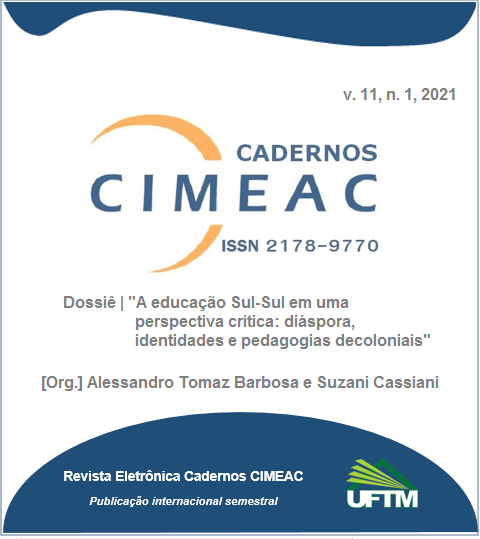Timorização da Geografia escolar: tecendo interlocuções sobre currículo, cultura e território
DOI:
https://doi.org/10.18554/cimeac.v11i1.5562Resumo
Neste artigo abordamos a relação entre currículo, cultura e território, dentro do contexto da Geografia escolar em Timor-Leste, problematizando a colonialidade presente em diferentes momentos da constituição dessa disciplina. Com base na perspectiva pós-crítica e pós-estruturalista da Teoria do Discurso de Ernesto Laclau, compreendemos que a elaboração e a implementação de um currículo estão carregadas de disputas discursivas entre contextos políticos, concepções institucionais e atores sociais envolvidos nesse processo. Metodologicamente, a partir de um levantamento documental, de interlocuções com profissionais da educação timorense e da análise do Manual do Aluno de Geografia (10º ano de escolaridade), verificamos que esta disciplina, historicamente, esteve voltada para atender à manutenção da colonização portuguesa, da ocupação territorial indonésia, e atualmente, está ligada a uma ótica geográfica estrangeira, por meio de uma reforma curricular conduzida predominantemente pela Cooperação Portuguesa. Consideramos assim, a importância da timorização da Geografia escolar, como um caminho decolonial, que contribui para que os professores timorenses sejam autônomos nos processos de elaboração, implementação e avaliação curricular, possibilitando a construção de outras formas de representações, sentidos e saberes geográficos diante de conteúdos curriculares prescritos.
Palavras-chave: Ensino de Geografia, Currículo; Práticas espaciais; Decolonialidade; Timor-Leste.
Abstract: In this article we approach the relationship between curriculum, culture and territory, within the context of school geography in East Timor, problematizing the coloniality present in different moments of constitution of this discipline. Based on the post-critical and post-structuralist perspective of Ernesto Laclau's Theory of Discourse, we understand that the development and implementation of a curriculum are fraught with discursive disputes between political contexts, institutional conceptions and social actors involved in this process. Methodologically, based on a documentary survey, interlocutions with Timorese education professionals and the analysis of the Geography Student Manual (10th year of schooling), we verify that this discipline, historically, has been geared to meet to the maintenance of Portuguese colonization, of the Indonesian territorial occupation, and currently, it is linked to a foreign geographical perspective, through a curricular reform conducted predominantly by Portuguese Cooperation. We consider, therefore, the importance of the timorization of school Geography, as a decolonial path, which may contribute for Timorese teachers to be protagonists in the processes of elaboration, implementation and curriculum evaluation, enabling the construction of other forms of representations, meanings and geographic knowledge in the face of prescribed curriculum content.
Keywords: Geography Teaching; Curriculum; Space practices; Decoloniality; East Timor.
Downloads
Publicado
Edição
Seção
Licença
Os autores que publicam nesta revista concordam com os seguintes termos:
(a) Não cobramos dos autores para a publicação neste periódico.
(b) Autores mantém os direitos autorais e concedem à revista o direito de primeira publicação, com o trabalho simultaneamente licenciado sob a Licença Creative Commons que permite o compartilhamento do trabalho com reconhecimento da autoria e publicação inicial nesta revista.
(c) Autores têm permissão e são estimulados a difundir e a distribuir a versão publicada de seu trabalho online (ex.: em repositórios institucionais ou na sua página pessoal) após o processo editorial, já que isso pode aumentar o impacto e a citação do trabalho publicado (Veja O Efeito do Acesso Livre).
* * *
AUTHORS COPYRIGHT AND PUBLISHING RIGHTS
Authors who publish with this journal agree to the following terms:
(a) This journal does not charge authors for publication.
(b) Authors retain copyright and grant the journal right of first publication with the work simultaneously licensed under a Creative Commons Attribution License that allows others to share the work with an acknowledgement of the work's authorship and initial publication in this journal.
(c) For authors whose articles have been accepted: authors are permitted and encouraged to post their work online (e.g., in institutional repositories or on their website) after the publication of the text in Cadernos CIMEAC, as it can lead to productive exchanges as well as earlier and greater citation of published work (See The Effect of Open Access).


 10.18554/cimeac
10.18554/cimeac


